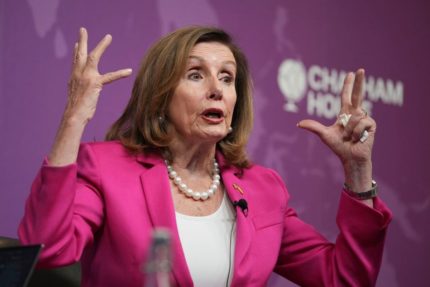In the aftermath of a stinging defeat, former Speaker of the House Nancy Pelosi has voiced her belief that the Democratic Party might have had a better outcome if President Joe Biden had left the race earlier. Speaking to The New York Times, Pelosi stated, “Had the president gotten out sooner, there may have been other candidates in the race.” As one of the most influential Democratic leaders in Washington, Pelosi’s remarks reflect growing frustration within the party as it grapples with losing the White House and potentially both chambers of Congress.
Pelosi,The former speaker, who led the Democratic push to oust Biden, alluded to his delayed exit, which only happened at the end of July, after enduring weeks of mounting pressure. Following Biden’s withdrawal, Vice President Kamala Harris was endorsed as his successor. Despite this backing, Harris ultimately lost to President-elect Donald Trump, leading to intensified post-election scrutiny within Democratic ranks.
Pelosi Calls for an Open Primary to Strengthen Party’s Stance
Pelosi contended that Harris’s candidacy would have benefited from an open primary process, wherein several Democratic contenders could have competed, giving party members a choice in selecting Biden’s successor. According to Pelosi, this could have made Harris “stronger going forward” as she faced the general election against Trump. However, with Biden’s late endorsement of Harris, any opportunity for a primary challenge was effectively closed.
Reflecting on the campaign’s trajectory, Pelosi noted the impact of Biden’s timing, adding, “If it had been much earlier, it would have been different.” Pelosi, who won her own 20th term in the House this election, emphasized that the condensed timeline left Harris with limited preparation for a highly competitive race. The delay also fueled internal party debate on how the Democratic leadership handled the succession, leaving some Democrats to wonder if the outcome might have differed under different circumstances.
Harris Campaign Blames Biden’s Decision, Faces Backlash
Within Harris’s camp, the response has been one of frustration, with anonymous aides lamenting the challenges of running under Biden’s shadow. Speaking to Politico, one Harris aide remarked, “We ran the best campaign we could, considering Joe Biden was president.” They went on to describe Biden as the “singular reason” for Harris’s defeat, suggesting that a clearer path might have emerged had he stepped aside sooner.
However, some former Biden aides have responded critically to these claims, accusing Harris’s team of deflecting responsibility. One former Biden adviser, speaking to Axios, questioned the Harris campaign’s effectiveness, highlighting their $1 billion expenditure. “How did you spend $1 billion and not win?” the aide asked pointedly, reflecting tensions within the Democratic establishment about where to assign blame for the loss.
Divided Democrats Look for Causes Amidst Election Fallout
Amid the finger-pointing, other prominent Democrats are weighing in on the election loss and the broader implications for the party. Senator John Fetterman of Pennsylvania directed criticism at those who actively worked to push Biden out, suggesting they “own the outcome and fallout.” Fetterman’s comments, shared with Semafor, hint at a divide between Democrats who backed Biden’s departure and those who believe the party would have fared better under his continued leadership.
Meanwhile, Representatives Tom Suozzi and Ritchie Torres pointed to ideological divides within the party as contributing factors to the election loss. Suozzi criticized the Democratic Party’s perceived focus on “being politically correct,” mentioning Republican attacks on issues like “defund the police” and “traditional values.” Torres, in a post on X (formerly Twitter), similarly faulted the “far left” for alienating key voter demographics, citing slogans like “Defund the Police” and divisive rhetoric. These divisions underscore the challenges Democrats face in reconciling a broad coalition as they regroup following the election.
Sanders, DNC Chair Harrison Offer Contrasting Views on Democratic Strategy
The internal reckoning continued with Independent Senator Bernie Sanders, who, in a statement, accused the Democratic Party of abandoning working-class Americans in favor of maintaining the status quo. Sanders, a vocal advocate for progressive policies, criticized party leaders for failing to resonate with voters’ needs, claiming they would likely not “learn from the election outcome.” Sanders’s remarks align with a progressive wing that has long called for the party to prioritize economic and social reforms over establishment interests.
However, Democratic National Committee (DNC) Chairman Jaime Harrison quickly rebutted Sanders’ accusations, labeling them as “straight up BS” in a post on X. Harrison’s response underscores a deepening divide within the Democratic Party as it struggles to bridge ideological and strategic differences. With mounting criticisms from both progressive and moderate factions, Democrats face a difficult path ahead in addressing the diverse concerns of their voter base and preparing for future electoral challenges














